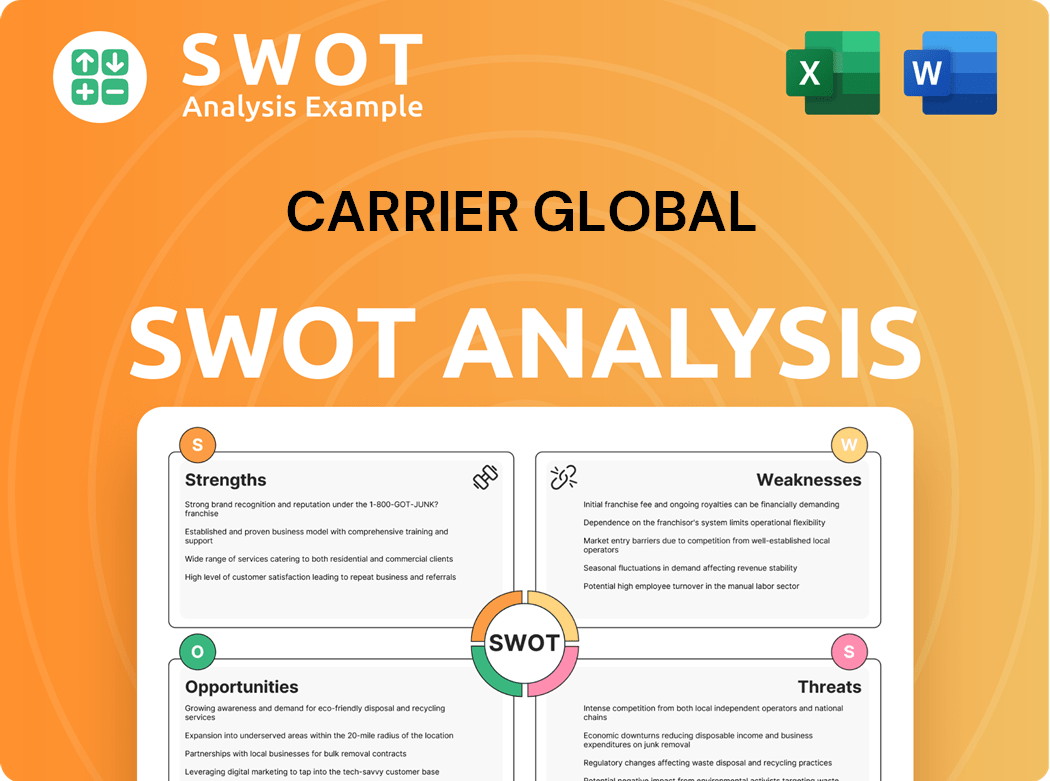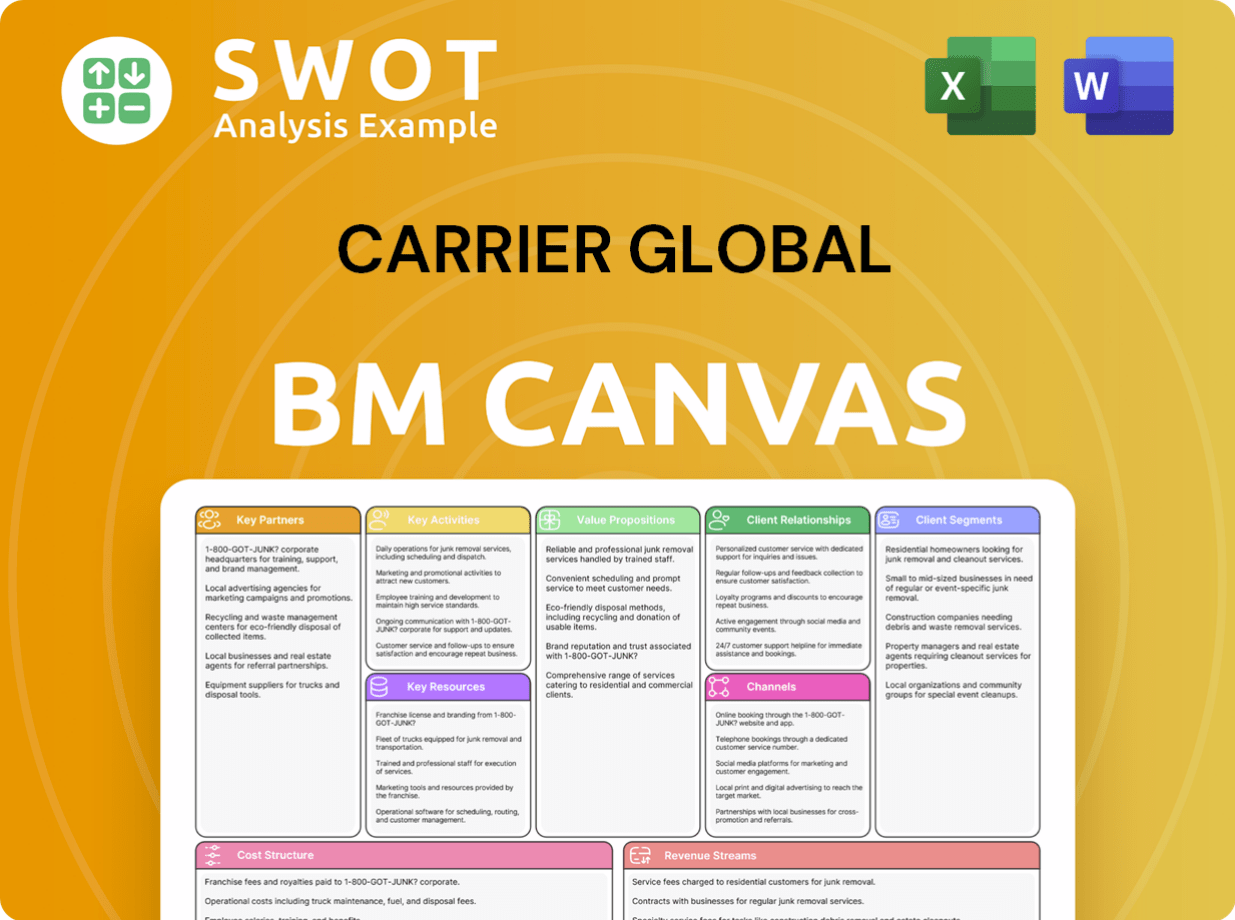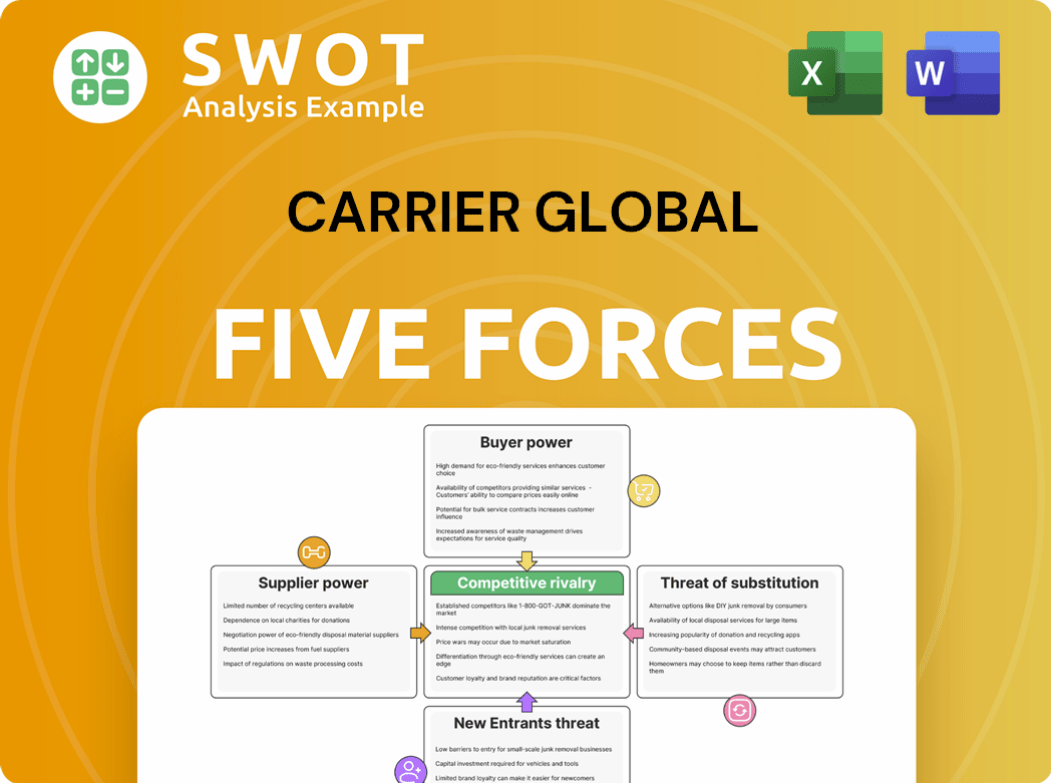Carrier Global Bundle
How Does Carrier Global Navigate Its Competitive Arena?
Carrier Global Corporation, a titan in intelligent climate and energy solutions, has a rich history dating back to the invention of modern air conditioning. From its roots in 1902, Carrier has evolved into a global leader, fundamentally changing comfort and industrial processes. Today, it's a pivotal player in both residential and commercial sectors, constantly adapting to market shifts.

This exploration of the Carrier Global SWOT Analysis delves into the intricacies of the Carrier Global competitive landscape, offering a detailed Carrier Global market analysis. We'll dissect the Carrier Global industry overview, identifying key HVAC market competition and Building automation rivals to understand Carrier Global competitors. Understanding these dynamics is crucial for anyone looking to grasp the company's position and future prospects in the evolving global market.
Where Does Carrier Global’ Stand in the Current Market?
Carrier Global Corporation holds a significant position in the HVAC, refrigeration, fire, and security sectors. The company serves a diverse global customer base across residential, commercial, and industrial segments. Its broad range of products and services consistently ranks among the top global players in HVAC. In 2023, Carrier reported net sales of $22.2 billion, reflecting its substantial scale within the industry.
Carrier's core operations include residential and commercial HVAC systems, transport refrigeration units, commercial refrigeration, and fire and security solutions. Geographically, Carrier operates across North America, Europe, Asia, and other key markets. The company has been strategically shifting towards higher-growth and higher-margin businesses. This strategic repositioning aims to enhance its financial health and improve its overall market standing.
Carrier's financial performance, including its adjusted operating profit of $2.6 billion in 2023, underscores its strong position relative to industry averages. The company continues to invest in digital transformation and sustainable offerings, further solidifying its leadership in areas such as energy-efficient buildings and cold chain solutions. For more details on how Carrier generates revenue, check out the Revenue Streams & Business Model of Carrier Global.
Carrier Global's market position is strengthened by its diverse product portfolio and global presence. The company's focus on innovation and sustainability further enhances its competitive edge. The company's strategic divestitures and investments are aimed at improving its market share.
The HVAC market is highly competitive, with several major players vying for market share. Key competitors include Johnson Controls, Daikin, and Trane Technologies. These companies compete on product innovation, pricing, and service quality.
In the building automation sector, Carrier faces competition from companies that offer integrated building management systems. These competitors focus on smart building technologies and energy efficiency. Competition drives innovation and efficiency.
Carrier Global's main competitors include companies like Johnson Controls, Daikin, and Trane Technologies. These competitors have a global presence and offer a wide range of products and services. Carrier's competitive strategy includes a focus on innovation and sustainability.
Carrier Global's competitive advantages include its extensive product portfolio, global reach, and focus on innovation. The company's investments in sustainable solutions and digital transformation further enhance its position. Carrier's strong financial performance supports its ability to compete effectively.
- Extensive product portfolio across HVAC, refrigeration, and fire & security.
- Global presence with operations in North America, Europe, and Asia.
- Focus on sustainable solutions and energy-efficient technologies.
- Strong financial performance, including an adjusted operating profit of $2.6 billion in 2023.
Carrier Global SWOT Analysis
- Complete SWOT Breakdown
- Fully Customizable
- Editable in Excel & Word
- Professional Formatting
- Investor-Ready Format

Who Are the Main Competitors Challenging Carrier Global?
Understanding the Carrier Global Corporation competitive landscape is crucial for assessing its market position and strategic direction. This involves a detailed Carrier Global market analysis to identify key players and their respective strengths. The Carrier Global industry overview reveals a dynamic environment shaped by technological advancements, sustainability demands, and evolving customer needs.
The company faces competition across its diverse business segments. This competitive landscape includes both direct and indirect rivals, ranging from established industrial giants to specialized technology firms. Analyzing these competitors helps to understand the challenges and opportunities for Carrier Global in the global market.
In the HVAC sector, Carrier Global competes with several major players. These competitors include Daikin Industries, Johnson Controls International, Trane Technologies, and Lennox International. Each company brings unique strengths and strategies to the market, influencing the overall competitive dynamics.
Daikin, a Japan-based multinational, is a significant competitor. It is known for its extensive range of residential and commercial HVAC systems. Daikin has a strong presence in Asian markets and is continuously expanding its global footprint.
Johnson Controls offers a broad portfolio of building technologies. This includes HVAC, fire, and security systems, often competing directly with Carrier Global for large commercial building projects. It has a strong focus on integrated building solutions.
Trane Technologies specializes in heating, ventilation, and air conditioning systems and services. It has a strong focus on sustainable solutions. The company is a key player in the HVAC market, known for its innovation and efficiency.
Lennox International is a prominent competitor in the North American residential and light commercial HVAC markets. It focuses on providing reliable and efficient HVAC solutions. Lennox has a strong brand presence in the United States.
In the refrigeration segment, Carrier Global faces competition from companies like Ingersoll Rand (with its Thermo King brand) in transport refrigeration, and various specialized manufacturers in commercial refrigeration. These competitors focus on specific niches within the refrigeration market.
The fire and security segment sees competition from companies such as Johnson Controls, Honeywell International, and numerous regional providers of fire suppression and security systems. These competitors challenge Carrier Global through aggressive pricing strategies, continuous product innovation, and strong brand recognition. The industry also sees emerging players focusing on niche markets or disruptive technologies, particularly in energy management and smart building solutions. Mergers and acquisitions continually reshape competitive dynamics, as seen in recent activity within the building technology space. For example, in 2024, the building automation sector saw significant consolidation, impacting the competitive landscape. You can find more information about the company's performance in this article on the Carrier Global's market share analysis 2024.
Several factors drive competition in the building solutions and HVAC markets. These include:
- Pricing Strategies: Competitors often employ aggressive pricing to gain market share.
- Product Innovation: Continuous development of new and improved products is crucial.
- Brand Recognition: Strong brand reputation helps in customer acquisition and retention.
- Distribution Networks: Extensive distribution networks ensure product availability.
- Digital and Smart Building Technologies: Advancements in these areas are increasingly important.
Carrier Global PESTLE Analysis
- Covers All 6 PESTLE Categories
- No Research Needed – Save Hours of Work
- Built by Experts, Trusted by Consultants
- Instant Download, Ready to Use
- 100% Editable, Fully Customizable

What Gives Carrier Global a Competitive Edge Over Its Rivals?
The competitive landscape for Carrier Global Corporation is shaped by its strong brand recognition and legacy in the HVAC and building solutions sectors. This legacy, originating with Willis Carrier's invention of modern air conditioning, has cultivated significant customer trust and loyalty. The company’s strategic moves and investments in innovation, particularly in energy-efficient systems and smart building controls, have further solidified its market position.
A key aspect of Carrier’s competitive edge lies in its extensive global distribution network and service capabilities, which enable it to reach a vast customer base and provide comprehensive after-sales support. Carrier's financial performance is closely watched, and its ability to maintain and grow its market share against competitors like Johnson Controls is a critical indicator of its success. The company’s focus on sustainability and environmentally friendly products, such as those using refrigerants with lower global warming potential, also enhances its market appeal.
Carrier Global's ability to adapt to market dynamics and technological advancements is crucial. A detailed Marketing Strategy of Carrier Global shows how the company is positioning itself to capitalize on emerging opportunities in the building automation sector.
Carrier's brand is a significant competitive advantage in the HVAC market competition. Its long-standing reputation for innovation, stemming from its origins with Willis Carrier's invention of modern air conditioning, fosters customer loyalty. This legacy is particularly beneficial in established markets where brand trust is paramount.
Carrier invests heavily in proprietary technologies, particularly in energy-efficient HVAC systems and smart building controls. These innovations enhance product efficiency and offer advanced control capabilities. Investments in digital solutions and IoT connectivity for its products are also key.
Carrier's extensive global distribution network and service capabilities provide a significant operational advantage. This allows the company to reach a vast customer base and offer comprehensive after-sales support. The network includes direct sales forces, independent distributors, and service centers.
The company's focus on sustainability and environmentally friendly products, such as those utilizing refrigerants with lower global warming potential, aligns with evolving market demands. This focus enhances its appeal and positions it well for future regulatory changes. This is a key factor in the Carrier Global competitive landscape.
Carrier Global's competitive advantages include a strong brand, technological innovation, and a global presence. The company's financial performance is closely watched, and its ability to maintain and grow its market share against competitors like Johnson Controls is a critical indicator of its success. Analyzing the HVAC market competition and understanding building automation rivals is vital for understanding the company’s position.
- Brand Strength: Strong brand equity and customer loyalty.
- Technology Leadership: Proprietary technologies in energy-efficient HVAC and smart building controls.
- Global Reach: Extensive distribution and service network.
- Sustainability Focus: Commitment to environmentally friendly products.
Carrier Global Business Model Canvas
- Complete 9-Block Business Model Canvas
- Effortlessly Communicate Your Business Strategy
- Investor-Ready BMC Format
- 100% Editable and Customizable
- Clear and Structured Layout

What Industry Trends Are Reshaping Carrier Global’s Competitive Landscape?
The Carrier Global competitive landscape is currently shaped by significant industry trends, presenting both opportunities and challenges. The company faces intense competition in the HVAC market, particularly from established players and emerging competitors. A deep dive into Carrier Global market analysis reveals that the business must navigate a dynamic environment characterized by technological advancements, sustainability demands, and global economic shifts. Understanding the Carrier Global industry overview is crucial for assessing its strategic positioning.
Key risks include price competition, supply chain volatility, and the potential for disruptive technologies. However, the company is also well-positioned to capitalize on the growing demand for sustainable and energy-efficient solutions, along with the opportunities presented by digitalization and the service-based economy. Carrier Global's future outlook hinges on its ability to innovate, adapt to market changes, and execute its strategic initiatives effectively. For a deeper understanding, consider reading a Brief History of Carrier Global.
The HVAC industry is experiencing a surge in demand for energy-efficient and sustainable solutions. This is driven by stringent environmental regulations and rising energy costs. Digitalization, IoT, and AI are transforming the industry, enabling advanced features like predictive maintenance and remote monitoring.
Intense price competition, especially from Asian manufacturers, poses a significant challenge. Disruptive technologies from new market entrants could also impact the company's market share. Global economic shifts, supply chain volatility, and geopolitical tensions add to the complexity.
The demand for sustainable solutions and green building initiatives presents a major opportunity. The shift towards a service-based economy offers avenues for recurring revenue streams through maintenance contracts. Expanding digital offerings and strategic acquisitions can strengthen market position.
Focus on strategic portfolio transformation and investments in R&D for sustainable solutions are key. Expanding digital offerings and pursuing strategic acquisitions or partnerships are also important. The company is aiming to become a more integrated provider of intelligent climate and energy solutions.
In 2024, the global HVAC market is estimated to be worth over $150 billion, with a projected CAGR of around 5-7% over the next five years. Carrier Global's market share analysis 2024 indicates a strong position in North America, but faces increasing competition globally. The company's focus on sustainable solutions aligns with the growing demand for energy-efficient products, and its R&D spending is approximately $500 million annually to support innovation.
- HVAC market competition includes companies like Johnson Controls, Daikin, and Trane Technologies.
- Building automation rivals are also increasing, with companies like Siemens and Honeywell competing in the smart building solutions space.
- Carrier Global's competitors are constantly innovating, requiring the company to stay ahead in terms of technology and sustainability.
- The company's financial performance, compared to Carrier Global's competitors, shows a commitment to sustainable practices.
Carrier Global Porter's Five Forces Analysis
- Covers All 5 Competitive Forces in Detail
- Structured for Consultants, Students, and Founders
- 100% Editable in Microsoft Word & Excel
- Instant Digital Download – Use Immediately
- Compatible with Mac & PC – Fully Unlocked

Related Blogs
- What are Mission Vision & Core Values of Carrier Global Company?
- What is Growth Strategy and Future Prospects of Carrier Global Company?
- How Does Carrier Global Company Work?
- What is Sales and Marketing Strategy of Carrier Global Company?
- What is Brief History of Carrier Global Company?
- Who Owns Carrier Global Company?
- What is Customer Demographics and Target Market of Carrier Global Company?
Disclaimer
All information, articles, and product details provided on this website are for general informational and educational purposes only. We do not claim any ownership over, nor do we intend to infringe upon, any trademarks, copyrights, logos, brand names, or other intellectual property mentioned or depicted on this site. Such intellectual property remains the property of its respective owners, and any references here are made solely for identification or informational purposes, without implying any affiliation, endorsement, or partnership.
We make no representations or warranties, express or implied, regarding the accuracy, completeness, or suitability of any content or products presented. Nothing on this website should be construed as legal, tax, investment, financial, medical, or other professional advice. In addition, no part of this site—including articles or product references—constitutes a solicitation, recommendation, endorsement, advertisement, or offer to buy or sell any securities, franchises, or other financial instruments, particularly in jurisdictions where such activity would be unlawful.
All content is of a general nature and may not address the specific circumstances of any individual or entity. It is not a substitute for professional advice or services. Any actions you take based on the information provided here are strictly at your own risk. You accept full responsibility for any decisions or outcomes arising from your use of this website and agree to release us from any liability in connection with your use of, or reliance upon, the content or products found herein.